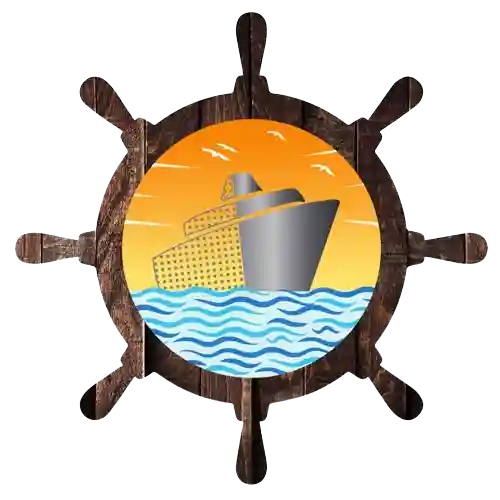Seasickness: Why People Don’t Fall Sick on Ships?
Have you ever wondered why people don’t fall sick as often on ships? Despite being near others and sharing common spaces, outbreaks of illnesses on ships are relatively rare. Here are some reasons:
1. HYGIENE

Ships have strict hygiene measures in place to prevent the spread of illnesses. Crew members are trained to maintain cleanliness and disinfect surfaces regularly.
Every week cabin inspection is done by the Master and Chief mate. Weekly cabin inspections are crucial for maintaining hygiene and safety onboard ships.
They ensure that the living quarters of crew members and officers are clean and free from any potential hazards that could cause illness or injury. By carrying out regular inspections, any issues can be identified and addressed promptly before they become a larger problem.
This helps to prevent the spread of illnesses and ensures that crew members have a comfortable and safe living environment.
2. LAUNDRIES ON THE SHIP

Laundry on ships is an essential service that is provided to crew members and officers. Onboard laundry facilities help to ensure that crew members have access to clean clothing and linens throughout their time on the ship. Here’s what you need to know about laundry on ships
The laundry process on ships typically involves the following steps:
- Different Laundries: Onboard Ship there are separate laundries for both officers and crew
- Sorting: The laundry is sorted into different categories. Every laundry will have two machines. One will be for Boiler suits which might contain grease or oil and the other will be for your civil clothes to ensure that each load is washed properly, and proper hygiene standards are followed
- Washing: The laundry is washed in industrial washing machines, using detergents and fabric softeners that are safe for the environment and the ship’s wastewater system.
3. PERSONAL HYGIENE

Maintaining personal hygiene is essential on a ship, where crew members are living and working in close quarters. Personal hygiene practices help to prevent the spread of illnesses and diseases and ensure a safe and healthy environment for everyone onboard. Here are some tips for maintaining good personal hygiene on ships:
- Wash your hands frequently: One of the most effective ways to prevent the spread of germs is to wash your hands regularly. You will find posters everywhere on ships “Please wash your hands properly.” All the common washrooms and spaces are provided with Handwash, Tissue Papers and Towels onboard ship.
- Use hand sanitiser: Sanitisers, Gloves and masks are provided free of cost by the company to the crew members to maintain hygiene to avoid isolation situations.
- Free washing and Bathing Soap: Seafarers are provided free washing and bathing soap. The ship’s laundry facilities will also provide free detergent for crew members to use when washing their clothes.
4. QUALITY FOOD ON THE SHIP

On large vessels (galley department), it is more likely that there will be one Chief Cook, and one trainee cook/ G.S. Having access to quality food is essential for maintaining good health and wellness on a ship. Crew members onboard ships work long hours and can be subjected to high-stress situations, making it important to have nutritious and delicious food options available to them.
How all this is achieved?
On ships, vegetables, meat, and fish are stored in refrigerated rooms or cold storage areas to slow down bacterial growth and keep the food fresh for longer periods.
Refrigerated rooms or cold storage areas are designed to maintain a constant temperature that is suitable for the type of food being stored. The temperature in these rooms is typically between 0-5 degrees Celsius for fresh produce and between -18 to -20 degrees Celsius for frozen products like fish and meat.
The Chief Cook is responsible for managing the galley or kitchen onboard a ship and ensuring that the food prepared and served to the crew is of high quality and safe to consume. Maintaining hygiene on a ship is critical for preventing the spread of illnesses and maintaining the health of the crew. The chief cook is well-trained, and he holds a COC.
To prevent cross-contamination, colour-coded cutting boards are used in the galley. For example, a red cutting board may be used for cutting raw meat, while a green cutting board may be used for cutting vegetables. This helps to prevent bacteria from spreading between different food groups.
MLC inspect ships and if any insects or other foreign object is found in the galley could result in penalties or detention of the ship. This strict law guarantees quality food and a neat galley or mess.
5. ATMOSPHERE CONTROL ON THE SHIP

Atmosphere control is an important aspect of maintaining a safe and comfortable environment on a ship, particularly in spaces such as living quarters and engine rooms.
Temperature and Relative Humidity are kept at the Optimum side. Not too hot nor too Cold.
Although there is huge temperature variation inside and outside accommodations like deck a, engine room, engine control room, and accommodation. The temperature variation doesn’t matter as other factors are considered like proper diet, hygienic living cabin and physical work in the deck and engine room, and accommodation. Temperature and humidity control help in sound sleep thus rejuvenating energy to make wise and logical decisions in cargo operations, bridge lookout, and engine room duties.
6. DRINKING WATER ON THE SHIP

Ships produce fresh water by the process of distillation and reverse osmosis. It uses the main engine jacket cooling water to convert Saltwater to Freshwater
Drinking water is a vital resource on a ship, and ensuring a safe and adequate supply is critical for the health and well-being of crew members
The water quality is tested every week by the ship’s crew and every 6 months shore analysis of water is carried out.
Fresh water generators are an essential piece of equipment on a ship, as they provide a reliable source of fresh water for drinking, cooking, cleaning, and other uses. They are typically designed to operate continuously and can produce large quantities of fresh water to meet the needs of the crew on board.
In case of failure of the Freshwater Generator company provides packed drinking water i.e. mineral water.
7. SEWAGE TREATMENT PLANT

A sewage treatment plant is a crucial piece of equipment on a ship, as it is responsible for treating the wastewater generated on board to prevent pollution of the marine environment.
Wastewater from sinks, toilets, showers and other sources is collected in holding tanks on the ship.
The wastewater is treated using a Sewage Treatment plant before disposal so that it does not harm the environment
Once the wastewater has undergone primary and secondary treatment, it is disinfected using ultraviolet light, chlorine, or other methods to kill any remaining pathogens.
The treated wastewater is then discharged into the ocean in compliance with regulations set by the International Maritime Organization (IMO) and other regulatory bodies.
In sewage treatment plant the sewage is decomposed by anaerobic bacteria which decomposes the sewage and sludge and releases harmful H2S and methane gas which are dangerous to marine species.
8. GARBAGE SEGREGATION IN SHIP

Garbage handling on a ship is essential to prevent marine pollution and protect the marine environment.
In ships, details procedures for collecting, processing, stowing, and disposing of the garbage are mentioned. Garbage segregation is under MARPOL ANNEX V regulation of the prevention of pollution by garbage from ships.
Garbage is stored in designated areas on the ship to prevent contamination and odour. Special containers may be used for hazardous waste
Certain types of waste, such as oily rags and contaminated materials, may be incinerated on board in specially designed incinerators. The ash produced from incineration is stored on board for disposal at a port reception facility.
The following items are there for garbage segregation: –
o Placards posted on the board providing the discharge requirements
o A Garbage Management Plan
o A Garbage Record Book
Some types of garbage, such as food waste, can be discharged into the sea under certain conditions and restrictions outlined in the GMP. However, the discharge of plastics, synthetic ropes, and other materials that do not readily biodegrade is prohibited.
Garbage that cannot be handled on board must be properly stored and discharged at port facilities that are authorized to handle the ship-generated waste and a proper entry of that shall be made in Garbage Record Book
9. OTHER FACTORS
Clean Fresh Air – The air at sea is free from the pollution which is good for health
Animals and Plant – Seafarers mostly stay away from Plants and Animals as it is not allowed to carry animals and plants which reduces the chances of Disease which spread through Plants and Animals.
Disclaimer :- The opinions expressed in this article belong solely to the author and may not necessarily reflect those of Merchant Navy Decoded. We cannot guarantee the accuracy of the information provided and disclaim any responsibility for it. Data and visuals used are sourced from publicly available information and may not be authenticated by any regulatory body. Reviews and comments appearing on our blogs represent the opinions of individuals and do not necessarily reflect the views of Merchant Navy Decoded. We are not responsible for any loss or damage resulting from reliance on these reviews or comments.
Reproduction, copying, sharing, or use of the article or images in any form is strictly prohibited without prior permission from both the author and Merchant Navy Decoded.


